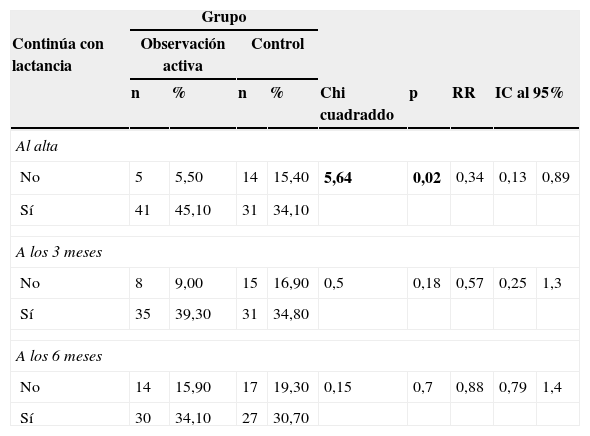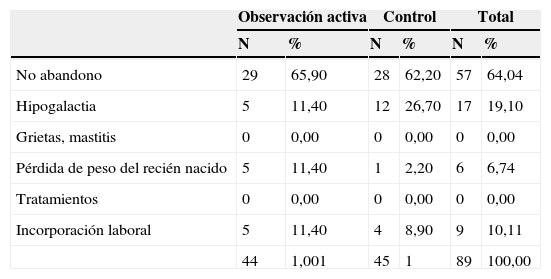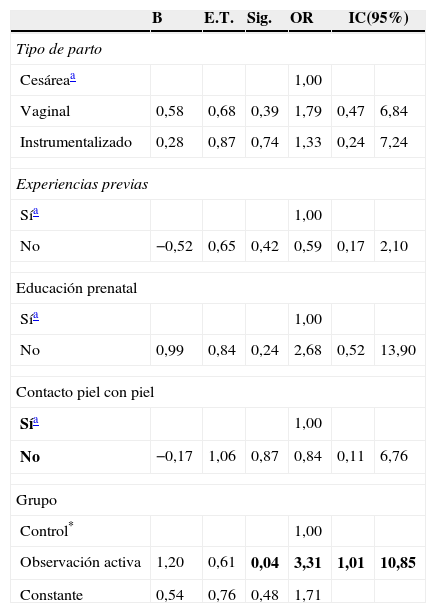Evaluar la eficacia de una intervención enfermera basada en la observación activa y resolución de dudas en lactancia materna en las 24-48 h posparto sobre el abandono de lactancia materna.
MétodosEnsayo clínico llevado a cabo en el Hospital General Universitario Ciudad Real. Los sujetos de estudio son 100 mujeres sanas que dan a luz un recién nacido sano.
ResultadosLos resultados muestran que un 39,8% de las mujeres tienen problemas para dar el pecho y un 72% necesita ayuda para iniciar la lactancia materna. Aproximadamente un 79,9% continúa con la lactancia materna al alta hospitalaria gracias a nuestra intervención.
El abandono de lactancia materna, al alta hospitalaria, era de un 31,1% en el grupo control y de un 10,9% en el grupo experimental, mostrando diferencias significativas en ambos grupos con un RR 1,29 y un IC de 1,04-1,61. En relación con la causa de abandono, la hipogalactia es la más frecuente, sin diferencias significativas en ambos grupos.
A los 3 meses el abandono de la lactancia fue de 16,9% en el grupo control y de un 9% en el grupo experimental. A los 6 meses no continúan con lactancia materna un 19,3% en el grupo control frente un 15,9% en el grupo experimental.
ConclusiónLas acciones protocolarizadas posnatales, y no solo intervenir cuando existan problemas en dar el pecho, son eficaces para la instauración de la lactancia materna al alta hospitalaria.
evaluate the efficacy of a nursing intervention based on active observation and resolution of the problems of breastfeeding in the period 24-48h post-partum as regards stopping breastfeeding in mothers who gave birth in Hospital General Universitario, Ciudad Real.
MethodsA clinical trial was conducted on 100 healthy women who had given birth to a healthy baby in the maternity unit of the Hospital General Universitario Ciudad Real.
ResultsThe results showed that 39.8% of women have problems, and 72% need help to initiate the breastfeeding. Approximately 79.9% continue with breastfeeding after hospital discharge as a result of our intervention.
Breastfeeding was stopped by 31.1% of the control group, and by 10.9% in the experimental group (nursing intervention), with significant differences being observed in both groups, with RR 1.29 and 95% CI; 1.04-1.61. Hypogalactia (low milk production) was the most frequent reason for stopping, with no differences in both groups.
At 3 months, 16.9% had stopped breastfeeding in the control group, and 9% in the experimental group. At 6 months, 19.3% of the control group did not continue with breastfeeding versus 15.9% in the experimental group.
ConclusionAction, and not only intervention, protocols in the period 48h pospartum when there were problems with breastfeeding were effective for initiation breastfeeding at hospital discharge.
Artículo
Comprando el artículo el PDF del mismo podrá ser descargado
Precio 19,34 €
Comprar ahora











